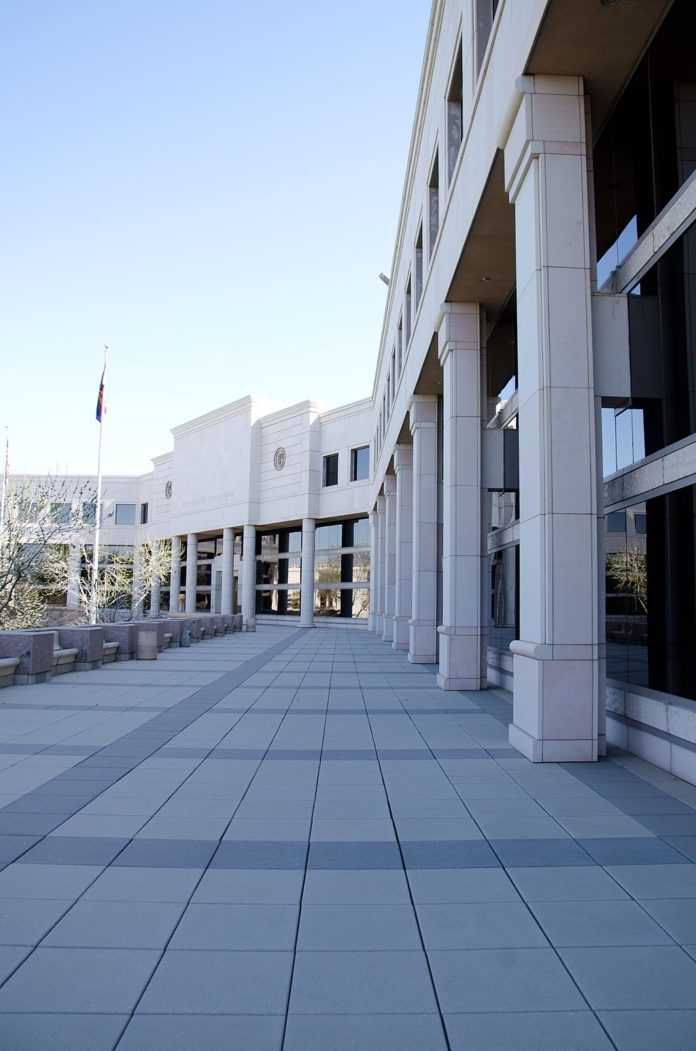
Arizona courts are entering new legal waters by exploring innovative procedures and technology such as videoconferencing to hold jury trials during the coronavirus pandemic.
Largely rural Mohave County recently held a criminal trial during which jurors viewed the proceedings by watching Zoom from elsewhere in the courthouse to help the panel and other trial participants spread out.
In metro Phoenix, Maricopa County Superior Court officials put trials on hold during the pandemic but now plan to begin empaneling new juries starting Aug. 1 — with changes in the courthouses and the possibility that some jurors would serve remotely from home.
Courts across the country already conduct proceedings such as motions hearings with lawyers and other participants joining remotely.
Arizona isn’t alone in experimenting with using virtual technology in jury trials. A court in metro Dallas in May used Zoom to conduct an entire jury trial in a civil case involving a disputed insurance claim.
The Arizona Supreme Court has authorized the state court system to use videoconferencing and other technology for purposes such as social distancing for health and safety during court proceedings, including jury selection.
Mohave County Superior Court recently used technology to distance jurors during a man’s two-day criminal trial on drug charges.
The trial was held with some jurors in the courtroom and others watching the proceedings via Zoom while elsewhere in the courthouse, Today’s News-Herald reported.
Zoom also was used to select the jury for the trial, the Mohave County court’s first criminal trial since the start of the pandemic.
“I think everything went pretty well, especially for a first-time process that we haven’t had before,” Christina Spurlock, the court’s deputy director, told the newspaper.
Maricopa County Superior Court plans to resume jury selection on Aug. 1. Presiding Civil Judge Pamela Gates said court officials “continue to assess and re-assess every day” what proceedings should be conducted in person vs. remotely and how.
Court officials still want to have trials with in-person juries, but they are experimenting with variations and alternatives that could include having some juries participate remotely, Gates told The Associated Press during an interview Friday.
The court’s civil department created a task force to help evaluate ideas and held a mock in-person jury trial to understand what a civil proceeding would look like during the pandemic.
The volunteer mock jurors spread out in a courtroom instead of being clustered in the jury box. Everybody in the courtroom wore masks or face shields.
One consideration with in-person juries during the pandemic is that jurors in a courtroom all would be masked and distanced, making it harder for them to get to know each other and form bonds that help with deliberations, Gates said.
Using remote technology could help in that regard, she said.
“It’s a different form of justice when you are sentencing somebody wearing a face mask or a face shield,” Gates said. “Everybody is re-calibrating what justice looks like in a pandemic.”
Considerations on whether individual prospective jurors could serve from home include whether they have a device with a camera, consistent internet service, a quiet space and uninterrupted time, Gates said.
Court officials are preparing a grant-funded program to loan camera-equipped devices to prospective jurors who lack them but who could serve while at home, Gates said.
Purchasing the devices likely would be easier than the logistics of furnishing them to individuals and then retrieving he devices when the trial is complete, she said.
One idea being considered in civil cases is to hold a mini-trial for jurors to decide an issue hinging on credibility of witnesses, and then presenting the jury’s findings to the sides in a lawsuit to possibly help them reach a settlement during a conference with a judge acting as an intermediary.
That could potentially resolve a case without holding a lengthy trial and reduce the time that attorneys, court personnel, witnesses, jurors and others spend in the courthouse, she said.
“We’re trying to be very creative,” Gates said. “We have to recognize the health and safety of all the participants in a trial.”
For most people, the new coronavirus causes mild or moderate symptoms, such as fever and cough that clear up in two to three weeks. For some, especially older adults and people with existing health problems, it can cause more severe illness, including pneumonia, and death.
Republished with the permission of the Associated Press.














